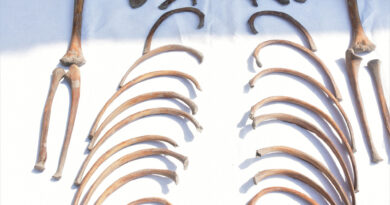White Men Cant Jump, New Swiss Study Suggests Gene Variant In Africans Helps Them Jump Better Than Other People
A new study by a Swiss university has suggested that some black people can jump better than other people thanks to a gene that makes the tendons in their heels stronger.
The study was conducted by researchers at ETH Zurich and at the University of Zurich, both of which are universities in the city of Zurich in Switzerland, with the experts saying that some black people might have developed this gene because it also helps fight malaria.
In a statement released by the university, they said that the researchers had “deciphered the cellular mechanisms that allow tendons to adapt to mechanical loads. People who carry a certain variant of a key gene in this mechanism can jump better than others.”

The study was led by Professor Jess Snedeker. He is quoted in the statement as saying: “We now understand better how tendons work. That should also help to be able to treat tendon injuries better in the future.”
Fabian Passini, a PhD student in Jess Snedeker’s group and the study’s first author, said in the statement: “It is fascinating that a gene variant that has developed due to an anti-malarial effect is also linked to better athletic abilities. We didn’t expect that at the beginning of the project.”
The study was assessing a protein gene called PIEZO1, and, more specifically a variant of it called PIEZO1 E756del, which is often found in people of West African descent, the study said. The study’s participants were all African-American. Those who were of West African descent achieved exceptionally good results with jumping performance when they had this gene variant in their genetic makeup, according to the study.

The study’s statement also said: “It could be that this gene variant partly explains why athletes with ancestry from countries where E756del is very common excel in sporting competitions, such as sprinting, long jump or basketball. Up to now there has not been any scientific investigation into whether this gene variant occurs more frequently among top athletes.”
When it comes to jumping, tendons are extremely important because they allow force to be transferred from a person’s muscles to their bones and generally speaking, if they are stiffer and stronger, they are more effective at doing this and therefore allow people to jump higher and further.
This means that people with stronger tendons perform better with high-level sports, like athletes running races or performing long jumps. The results of the study by the experts in Zurich reveal for the first time which protein gene is responsible for making a person’s tendons stronger and stiffer, according to the university.
A person’s tendon comprises collagen fibres. When collagen fibers shift against each other, the protein allows calcium ions to flow into the interior of the tendon cells. This produces certain enzymes that bind the fibres together – the tendons become less elastic, but stiffer and stronger.

There are several gene variants that code for this in humans, such as the variant called E756del, which a third of people of African descent carry. Experiments with mice showed that this gene variant is associated with stiffer tendons, according to the study.
The University said in its statement about the study: “A few years ago, other scientists showed that a certain variant with the name E756del occurs more frequently in people of West African descent. At that time, the importance of this protein for tendon stiffness was not yet known. A third of people of African descent carry this variant of the gene, while it is rare in other populations. This gene variant protects its carriers from the severe courses of the tropical disease malaria. Science assumes that the variant was able to gain acceptance in this population group because of this advantage.”
The researchers, led by Jess Snedeker, a Professor of Orthopaedic Biomechanics at ETH and the University of Zurich, then started conducting jumping tests with 65 African-American study participants, 22 of whom were carriers of this specific gene variant. The participants with the E756del variant jumped higher on average overall: they did 13 percent better than the other participants.
This means that the gene variant, that apparently developed due to its anti-malaria effects, is at the same time associated with better athletic abilities, the first author Fabian Passini was quoted as saying in the communication. Scientists will no doubt be keen to determine whether this gene variant occurs more frequently among top athletes.

The study was conducted by a large team comprising Fabian S. Passini, Patrick K. Jaeger, Aiman S. Saab, Shawn Hanlon, Nicole A. Chittim, Matthias J. Arlt, Kim David Ferrari, Dominik Haenni, Sebastiano Caprara, Maja Bollhalder, Barbara Niederoest, Aron N. Horvath, Tobias Goetschi, Shang Ma, Bettina Passini-Tall, Sandro F. Fucentese, Ulrich Blache, Unai Silvan, Bruno Weber, Karin Graevare Silbernagel and Jess G. Snedeker.
It was published in the academic journal Nature Biomedical Engineering on 24th May in an article titled “Shear-stress sensing by PIEZO1 regulates tendon stiffness in rodents and influences jumping performance in humans”.



